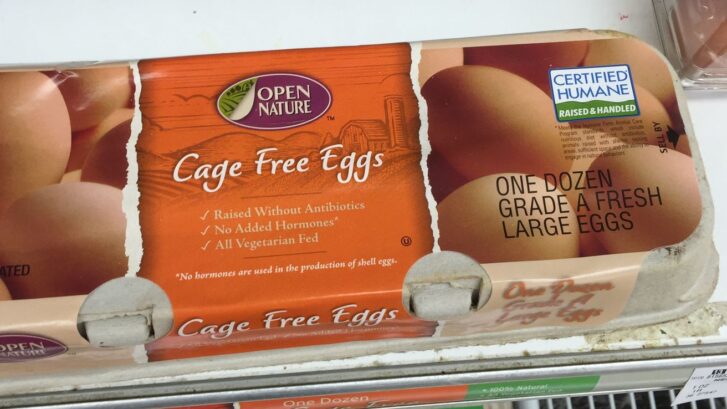Free-Range, Cage-Free, Organic: What Do Meat and Egg Labels Mean?
Our primary care concierge doctors in Jupiter know that these days our patients are interested in not just their own health, but also the health of the planet and the welfare of animals. So you try to shop in ways that consciously take all these factors into consideration.
But how do you know what the many bewildering grocery store labels mean? Let us help sort out some of the confusion.
Win-win Practices
According to Treehugger.com, so-called humane farming practices are no more sustainable than those of factory-farmed meats, because the animals raised for food require just as much food and water as those in concentrated animal feeding operations (CAFOs).
On the other hand, as the Cleveland Clinic points out, many of these CAFOs use more chemicals and fertilizers that pollute both the land and water sources, so they’re not as earth-friendly as traditional farming practices.
We’ve often extolled the health advantages of plant-based diets, however, so for now we’ll just say that the fewer meats and meat products you consume, the better for the planet (and your health).
The good thing about taking animal welfare into your buying decisions, however, is that you benefit, as well.
“The alternative to factory-farm meat—grass-fed meat—is not just better for the environment and better for the animals, but better for you, too,” says the Cleveland Clinic’s Functional Medicine Director Mark Hyman.
Grass-fed meat is so nutritionally superior to factor-farmed meat, he adds, that is practically a different food.
Animals raised without antibiotics are another health plus for humans because their rampant use can lead to the development of antibiotic-resistant bacteria, making it harder to treat our own infections.
Sorting Out Labels
Unfortunately, knowing their customers are interested in more humanely raised foods, many manufacturers select labels that may tend to mislead buyers.
For example, the U.S. Department of Agriculture (USDA) does not regulate the term “pasture-raised.” “Humane” is also not an official term, so it can mean anything.
Consumer Reports (CR) says that the claim “no growth hormones” doesn’t mean the animal was not given antibiotics, or that hogs were not given a non-hormonal growth enhancer called ractopamine. On the other hand, beef labels that say “no hormones” are useful, because cattle can be raised with hormones; however, the USDA does not allow hormones to be used in poultry or pork.
In addition, labels that say “no growth-promoting antibiotics” can also be misleading, because they can still be given to “ensure animal health” or to prevent or control disease, CR says.
Likewise, “natural” simply means that meat has been minimally processed and doesn’t contain any artificial ingredients such as chemical preservatives, spices or sauces, or artificial coloring. As Insider reports, a “natural” egg is simply a real egg that came from a real hen.
Similarly, “farm fresh” means nothing: All meat and eggs come from farms, whether in bucolic outdoor settings or cramped cages on CAFOs. And “Omega-3” doesn’t tell you whether the eggs contain enough of this essential fatty acid.
What They Mean
The labels manufacturers use can be baffling, so here’s a quick guide to the most common meat and egg labels.
Meats
- Grass-fed: This term gets a little tricky. The USDA’s definition means the meat must come from animals that have never been given grain and have access to pasture during the grazing season. According to CR, however, the USDA’s Food Safety and Inspection Service (FSIS) does not inspect these farms, and they can still be raised with antibiotics or hormones.
- In addition, grass-fed cattle still may not have continuous access to pasture and may spend at least a part of their lives confined to a feedlot.
- Organic: This is a more reliable term because the USDA organic seal indicates that the animal was given only organic feed, and was not given antibiotics or growth hormones. Even sick animals that were treated with antibiotics can no longer legally be labeled “organic.”
- Pasture-raised: Again, this term can be misleading, because many meat producers will use it if their cows were only periodically allowed brief access to the outdoors.
Eggs
- Cage-free: This means hens are not kept in cages, but that doesn’t mean they’re allowed outdoor access. In fact, they can still be raised in crowded (read: “overcrowded”) conditions indoors.
- Free-range: This means the animals have at least some access to the outdoors, and aren’t caged, but they still may be raised primarily in crowded conditions.
- Organic: These eggs come from hens that haven’t been fed grains grown with GMOs or synthetic pesticides. In addition, they aren’t raised in cages and must be given outdoor access. Again, though, “outdoor access” can still mean being confined in cramped conditions on tiny concrete porches.
- Pasture-raised: Although there’s no standard definition for this term if the egg label contains either the Certified Humane or American Humane Certified pasture-raised labels, it means the hens must have access to a pasture with room for natural behaviors, such as pecking for bugs and seeds.
How to be Sure
As Vox reports, “For the grocery shopper buying animal products, the independent rating programs created by advocacy programs are the most important labels to look out for, since they actually have auditing systems built in to hold producers accountable.”
These certification labels include “GAP-Certified,” “Certified Humane,” and “Animal Welfare Approved.”
Finally, remember that what’s best for animal welfare is usually best for our health, as well.

